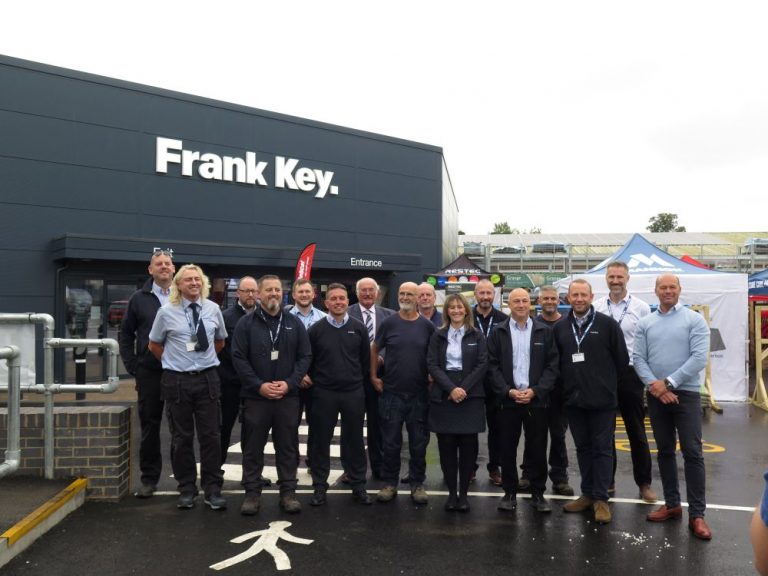Frank Key has joined the sponsor line up for the
East Midlands Bricks Awards 2025, backing the Deal of the Year category.
Since 1907 Frank Key has been renowned for supplying market-leading building, plumbing and timber materials. Built on family values, the business has grown to stock interiors, landscaping, civils and drainage products, as well as providing high-quality plant and tool hire equipment, making Frank Key a true one-stop shop for all your project requirements.
Frank Key’s reputation is not only built on the wide range of products sold, but how it does business. Given its experience within the industry and with many of the Frank Key team being long-standing members of staff, the firm is in the best position to provide you with the expert advice and service you need. Frank Key will order non-stocked items, stick to delivery dates and honour agreements.
Speaking with Business Link, Ben Sansom, Group Sales & Marketing Director at Frank Key, said: “Frank Key is delighted to sponsor the East Midlands Bricks Awards 2025.

“With over 110 years of experience supplying the building trade, we are proud to support an event that celebrates the incredible achievements in the property and construction sectors across our region. We wish all the nominees the very best of luck and look forward to seeing the innovative projects shaping the East Midlands.”
The East Midlands Bricks Awards, which will take place on
Thursday 2nd October at Nottingham’s famous
Trent Bridge Cricket Ground, celebrates the successes of property and construction companies in Derbyshire, Nottinghamshire, Leicestershire, Lincolnshire, and Northamptonshire.
Recognising those behind the changing landscape of the East Midlands, the occasion highlights development projects, businesses, and people in commercial and public building across the region – from office, industrial and residential schemes, through to community projects such as leisure schemes and schools. It also toasts the work of architects, agencies, and those behind large schemes.
Welcoming almost 150 professionals, nominating a company or project for the awards is a great way to showcase your successes, recognise your team’s efforts, bolster morale, and reach our audience of over 60,000 business readers, while also offering a chance to connect with respected professionals. It’s
completely free to enter and making the top three finalists in your category also wins you
free tickets to the event.
To make a nomination for the East Midlands Bricks Awards 2025, please click here.
Supporting imagery, video, documents, or links to these, can be sent to bricks@blmgroup.co.uk. Video nomination pitches are also welcome as an alternative or companion to written entries.
Categories include:
All finalists will have the chance to take home the Overall Winner award, which this year comes with a
grand prize of a year of marketing/publicity worth £20,000, with the opportunity to split or gift the marketing to a charity of your choice.
Nominations will close on Friday 15th August.
New for this year, all entrants will also have the opportunity to be featured on our dedicated nominee showcase on the East Midlands Business Link website, providing space for marketing your achievements.
The East Midlands Bricks Awards 2025
What: The East Midlands Bricks Awards 2025
When: Thursday 2nd October (4.30pm – 7.30pm)
Where: Derek Randall Suite,
Trent Bridge Cricket Ground, Nottingham
Keynote speaker: Councillor Nadine Peatfield – Leader of Derby City Council, Cabinet Member for City Centre, Regeneration, Strategy and Policy, and Deputy Mayor of the East Midlands
Tickets: Available
here
Dress code: Standard business attire
Thanks to our sponsors:












To be held at:








 “With over 110 years of experience supplying the building trade, we are proud to support an event that celebrates the incredible achievements in the property and construction sectors across our region. We wish all the nominees the very best of luck and look forward to seeing the innovative projects shaping the East Midlands.”
The East Midlands Bricks Awards, which will take place on Thursday 2nd October at Nottingham’s famous Trent Bridge Cricket Ground, celebrates the successes of property and construction companies in Derbyshire, Nottinghamshire, Leicestershire, Lincolnshire, and Northamptonshire.
Recognising those behind the changing landscape of the East Midlands, the occasion highlights development projects, businesses, and people in commercial and public building across the region – from office, industrial and residential schemes, through to community projects such as leisure schemes and schools. It also toasts the work of architects, agencies, and those behind large schemes.
Welcoming almost 150 professionals, nominating a company or project for the awards is a great way to showcase your successes, recognise your team’s efforts, bolster morale, and reach our audience of over 60,000 business readers, while also offering a chance to connect with respected professionals. It’s
“With over 110 years of experience supplying the building trade, we are proud to support an event that celebrates the incredible achievements in the property and construction sectors across our region. We wish all the nominees the very best of luck and look forward to seeing the innovative projects shaping the East Midlands.”
The East Midlands Bricks Awards, which will take place on Thursday 2nd October at Nottingham’s famous Trent Bridge Cricket Ground, celebrates the successes of property and construction companies in Derbyshire, Nottinghamshire, Leicestershire, Lincolnshire, and Northamptonshire.
Recognising those behind the changing landscape of the East Midlands, the occasion highlights development projects, businesses, and people in commercial and public building across the region – from office, industrial and residential schemes, through to community projects such as leisure schemes and schools. It also toasts the work of architects, agencies, and those behind large schemes.
Welcoming almost 150 professionals, nominating a company or project for the awards is a great way to showcase your successes, recognise your team’s efforts, bolster morale, and reach our audience of over 60,000 business readers, while also offering a chance to connect with respected professionals. It’s 















 With the capability to host events for up to 300 people Castle Meadow Central will become an integral part of the company’s portfolio of venues across Nottingham.
Castle Meadow Central is part of the wider Castle Meadow Campus and is located just a short walk from Nottingham Train station and Castle Wharf on the banks of the Nottingham and Beeston Canal.
Originally completed in 1994, Castle Meadow Central is widely regarded as a landmark of 1990s British architecture. Its distinctive tensile fabric roof, supported by four steel masts, remains a defining feature. The building was one of the first in the UK to achieve the highest possible BREEAM rating and was awarded both a Brick Award and a Concrete Society Certificate of Excellence in the 1990s.
The building has now been adapted for public and commercial use following a two-year renovation. It will offer a variety of flexible spaces, including five meeting rooms and a large central atrium suitable for conferences and larger events.
The ground floor will feature Deli Central, a café open to the public, providing locally sourced food and refreshments in a relaxed setting. The café will also serve the wider business community based at Castle Meadow Campus.
With the capability to host events for up to 300 people Castle Meadow Central will become an integral part of the company’s portfolio of venues across Nottingham.
Castle Meadow Central is part of the wider Castle Meadow Campus and is located just a short walk from Nottingham Train station and Castle Wharf on the banks of the Nottingham and Beeston Canal.
Originally completed in 1994, Castle Meadow Central is widely regarded as a landmark of 1990s British architecture. Its distinctive tensile fabric roof, supported by four steel masts, remains a defining feature. The building was one of the first in the UK to achieve the highest possible BREEAM rating and was awarded both a Brick Award and a Concrete Society Certificate of Excellence in the 1990s.
The building has now been adapted for public and commercial use following a two-year renovation. It will offer a variety of flexible spaces, including five meeting rooms and a large central atrium suitable for conferences and larger events.
The ground floor will feature Deli Central, a café open to the public, providing locally sourced food and refreshments in a relaxed setting. The café will also serve the wider business community based at Castle Meadow Campus.
 Tom Waldron-Lynch, CEO of Nottingham Venues, said: “Castle Meadow Central is one of the region’s most recognisable buildings. For many years it was home to HMRC, and while people in Nottingham have always known the building, very few have had the opportunity to step inside and experience it.
“That is now changing. We are delighted to be operating this iconic venue and opening it up for meetings, events and public use for the first time.
“Our aim is for Castle Meadow Campus to become a real asset to Nottingham, not just for the businesses based here, but for the wider community. With its unique design, central location and high-quality facilities, we hope it will become a valued part of Nottingham life for years to come.”
The opening will also create new local employment opportunities, with Nottingham Venues recruiting staff across hospitality, events and facilities roles.
Tom Waldron-Lynch, CEO of Nottingham Venues, said: “Castle Meadow Central is one of the region’s most recognisable buildings. For many years it was home to HMRC, and while people in Nottingham have always known the building, very few have had the opportunity to step inside and experience it.
“That is now changing. We are delighted to be operating this iconic venue and opening it up for meetings, events and public use for the first time.
“Our aim is for Castle Meadow Campus to become a real asset to Nottingham, not just for the businesses based here, but for the wider community. With its unique design, central location and high-quality facilities, we hope it will become a valued part of Nottingham life for years to come.”
The opening will also create new local employment opportunities, with Nottingham Venues recruiting staff across hospitality, events and facilities roles. 

